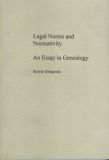用户登陆搜 索 |
查看图书
图书目录:Acknowledgements
Introduction I Recoiling Strategies 1 Montaigne 1.1 The Turning point: A Renaissant Interest in the Historicity of Law 1.2 Montaigne's Inquiry into the Sources of Legal Normativity 1.2.1 What do I Know? 1.2.2 Unveiling Law's Empirical Sources 1.2.3 Reconstructing the Precarious Authority of Law 2 Kelsen 2.1 The Prerequisites of Kelscn's Inquiry into Legal Normativity 2.1.1 The Prog-ramme: The Purity of the Pure Theoy 2.1.2 Why does Kelsen's Theory need to be Pure? 2.2 Explaining Legal Normativity "From Within' 2.2.1 Defining the 'Specific Lawfulness' of the Law 2.2.2 Kelsen's Awareness of The Theoretical Limits Striking his Project of Autonomy 2.3 Where Kelsen's 'Purity." Project' gets Defeated: Acknowledging Specific Forms of Conditionality" 2.3.1 'The Problem of Positivity 2.3.2 The 'Content' of the Basic Norm 3 Hart 3.1 Hart's and Kelsen's Understandings of Legal Normativity Contrasted 3.1.1 Underlying Methodological Assumptions 3.1.2 Telling Different Sides of the Story 3.1.3 The Role of the 'Ultimate Norm' 3.2 Raz's Account of the Contrast Between Hart's and Kelsen's Concepts of Normativity" 3.3 Where Hart and Kelsen Meet: the Scope of Appropriate Questions II A Genealogical Endeavour 4 The Method 4.1 Hypotheses, History and Philosophy 4.1.1 What the Story is Made of: History and Hypotheses 4.1.2 Philosophy as the ,as of Calling into Question 4.2 Pedigree or Genealogy'? 4.3 The Irrelevance Objection 4.3.1 Moral Legitimacy made Irrelevant 4.3.2 Genealogy made Superfluous 5 The Story 5.1 Taking the Law into our Own Hands 5.1.1 Case Stud3-: 'A Revolution without Revolutionaries' 5.1.2 Lending Authority- to a Contingent Power: The Call for Meta-referents 5.1.3 Disenchanted Lawmaking 5.2 Shaping the Law 5.2.1 What if we don't Care? 5.2.2 Why we Care, and How this Changes the Task of Lawmaking 6 Conclusion Bibliography Index |

